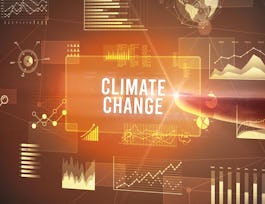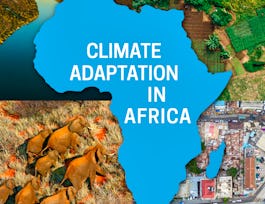This course challenges you to consider how one might lift societies out of poverty while also mitigating greenhouse gas emissions. We explore the inherent complexity of developing country governments wanting to grow their economies in a climate-friendly way. You will be introduced to an approach with which to address this challenge. The approach consists of a facilitated process whereby academic researchers and high-level influential actors within society co-produce knowledge. You will track this process in four Latin American countries - Brazil, Chile, Colombia, Peru, and South Africa. You will hear from various professionals about their contexts and the different challenges and opportunities the process includes.

New year. Big goals. Bigger savings. Unlock a year of unlimited access to learning with Coursera Plus for $199. Save now.


Climate Change Mitigation in Developing Countries

Instructor: Harald Winkler
48,351 already enrolled
Included with 
(565 reviews)
What you'll learn
Considering how one might lift societies out of poverty while also mitigating greenhouse gas emissions.
Insights into the complexity of how countries from the South pursue development goals while addressing climate mitigation.
Skills you'll gain
Details to know

Add to your LinkedIn profile
9 assignments
See how employees at top companies are mastering in-demand skills


Earn a career certificate
Add this credential to your LinkedIn profile, resume, or CV
Share it on social media and in your performance review

There are 6 modules in this course
Climate change and development both involve many complex problems. Each are 'wicked' problems, meaning they defy easy solutions. Tackling both development and climate change together is a 'super-wicked' problem. But we must start by taking a first step to responding to this 'super-wicked' problem. To do this we’ll share our experiments drawing particularly on the MAPS community, which includes Brazil, Chile, Colombia, Peru and South Africa.
What's included
6 videos4 readings1 assignment1 peer review2 discussion prompts
Our approach to mitigation and development is essentially a process that spurs change within a system. The premise is that change happens through co-production of knowledge, which in turn encourages action by actors in a system. We ask the questions: what is the best way to start such an intervention? What could the intervention look like? What are the options for the process design? This week we review the role a Scenario Building Team has to play in supporting knowledge generation.
What's included
8 videos1 reading2 assignments1 discussion prompt
Knowledge generated through research can effect change. We describe the models and tools that are available to support the generation of this knowledge. Apart from knowledge related to greenhouse gas mitigation and the costs thereof, we are interested in the positive and negative developmental impacts of moving to a low carbon economy. Emissions and costs are relatively easy to quantify but developmental impacts are less easily quantified. This week, we explore how this challenge can be addressed.
What's included
8 videos1 reading1 assignment1 peer review2 discussion prompts
What happens when your best efforts are not good enough? We will look at the ‘gaps’ between where we would like to be and where we are.The direction emission trends are headed is a function of everything put into the model (such as population, growth and GDP, and technology). Yet what is required by science is driven by considerations such as how we need to reduce emissions to keep temperature rises below two degrees. This week, in exploring some of the potential reasons for this gap we consider technical reasons and other pushbacks, like vested-interests, political or inherent human behaviour.
What's included
9 videos2 readings2 assignments2 discussion prompts
There are limitations within our existing toolsets and ways of thinking how we might address the mitigation gap. We need to look more closely at the interface of economic and development pathways and to question the way in which climate change mitigation professionals are approaching this huge and complex climate and development problem. Responses to these challenges include linking of economic and mitigation model to better understand the interconnectedness of mitigation policies and economic development, and involves out-of-the-box thinking when imagining climate and development solutions of the future. This week we hope to inspire innovations and responses to challenges in the climate mitigation and development community.
What's included
8 videos3 readings1 assignment1 peer review2 discussion prompts
This is the final module and it tells the story of how we have moved to the end of the scenario building process, and what the impacts of this approach are. This week we speak of two bridges: the bridge between knowledge and domestic policy, and domestic policy and international contributions.
What's included
11 videos3 readings2 assignments1 peer review2 discussion prompts
Instructor

Offered by
Recommended if you're interested in Environmental Science and Sustainability

EDHEC Business School

University of Cape Town

EDHEC Business School
Why people choose Coursera for their career




Learner reviews
565 reviews
- 5 stars
74.51%
- 4 stars
20.35%
- 3 stars
3.53%
- 2 stars
0.53%
- 1 star
1.06%
Showing 3 of 565
Reviewed on Jul 30, 2023
It was a wonderful experience considering that this is my first online course. I learned a lot. Thanks to all the contributors and those in charge of the course
Reviewed on Nov 11, 2017
This course was exceptional! This is a very engaging course. I enjoyed learning from others in the course about climate change and development in their countries.
Reviewed on Jun 6, 2020
Really , this is quite informative sessions. I have learned a lot and some of the practical implication experiences in a real life... Thanks a lot for such a wonderful course ..

Open new doors with Coursera Plus
Unlimited access to 10,000+ world-class courses, hands-on projects, and job-ready certificate programs - all included in your subscription
Advance your career with an online degree
Earn a degree from world-class universities - 100% online
Join over 3,400 global companies that choose Coursera for Business
Upskill your employees to excel in the digital economy
Frequently asked questions
Access to lectures and assignments depends on your type of enrollment. If you take a course in audit mode, you will be able to see most course materials for free. To access graded assignments and to earn a Certificate, you will need to purchase the Certificate experience, during or after your audit. If you don't see the audit option:
The course may not offer an audit option. You can try a Free Trial instead, or apply for Financial Aid.
The course may offer 'Full Course, No Certificate' instead. This option lets you see all course materials, submit required assessments, and get a final grade. This also means that you will not be able to purchase a Certificate experience.
When you purchase a Certificate you get access to all course materials, including graded assignments. Upon completing the course, your electronic Certificate will be added to your Accomplishments page - from there, you can print your Certificate or add it to your LinkedIn profile. If you only want to read and view the course content, you can audit the course for free.
You will be eligible for a full refund until two weeks after your payment date, or (for courses that have just launched) until two weeks after the first session of the course begins, whichever is later. You cannot receive a refund once you’ve earned a Course Certificate, even if you complete the course within the two-week refund period. See our full refund policy.


